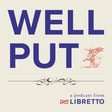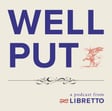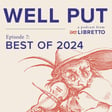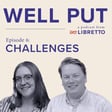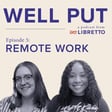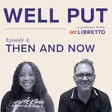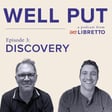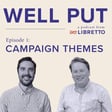Become a Creator today!Start creating today - Share your story with the world!
Start for free
00:00:00
00:00:01

Episode 2: How to Write a Perfect Sentence
A great sentence expresses ideas clearly and concisely, leaving audiences eager keep reading. But as a writer, how do you go from a spark of a thought to a tight, well-constructed sentence?
Join Adrian and Ian as they dissect some of their favorite lines from literature—as well as a few sentences they wrote themselves.
Hosted by Adrian Pio and Ian Sutherland
Produced by Tiffany Carlson
Edited by Connor Ferguson
Music by Coma-Media, via Pixabay
© 2024 Libretto. All rights reserved.
Recommended
Transcript
Introduction to Well Put Podcast
00:00:13
Speaker
Welcome to Well Put, podcast about communications for mission-driven organizations from Libretto.
Episode Theme: Analyzing Sentences
00:00:19
Speaker
I'm a senior creative lead, Adrian Pio. Hi, I am Ian Sutherland. I'm a creative lead at Libretto.
00:00:26
Speaker
And today, Adrian and I are going to pick a sentence that we've written that we're proud of and break down how we came up with it and why we like
The Art of the First Sentence
00:00:34
Speaker
it. And along the way, we'll discuss some of our favorite sentences in literature as well to give you a little bit more backstory in our own process.
00:00:43
Speaker
I think ah sentences obviously are the building blocks of narrative text. A lot of times it's the starting point and it can be the hardest place to start is that first sentence you put down on the page.
Ian's Favorite Sentence from '100 Years of Solitude'
00:00:55
Speaker
And so i thought maybe an interesting place for us to begin today would be to talk a little bit about some of our favorite first sentences, in this case from literature, just those are the the ones that folks tend to be most familiar with. Do you have, Ian, a favorite first sentence from a book you've read?
00:01:10
Speaker
I certainly do. And i was thinking of you as I was preparing for this conversation because we've spoken about this book before. 100 Years of Solitude by Gabriel Garcia Marquez, one of my favorite books ever, a fantastic chronicle of one family in the fictional town of Macondo.
00:01:29
Speaker
And the opening sentence, I remember reading it many years ago, i think in 2020, 2021,
00:01:35
Speaker
and it just hit me like a ton of bricks and i'll read it out loud here many years later as he faced the firing squad colonel orleano when guendia was to remember that distant afternoon when his father took him to discover ice i remember reading this at the beach i was on a family vacation in august we had all gone down to the jersey shore as we always do and it was a hot hot day and i had my feet in hot hot sand And reading that line, first of all, what a strange opening.
00:02:07
Speaker
He's in front of the firing squad he's thinking about discovering ice. What does that even mean?
Analysis of Marquez's Writing Style
00:02:15
Speaker
But I love that, just the fact that he's talking about this ice cold substance, ice, obviously, um on this hot day. It flooded me with curiosity. What's going on here? Why is this man in front of a firing squad?
00:02:29
Speaker
It also had a really unique treatment of time. The sentence kind of looks towards the future and invokes the past simultaneously. So I immediately, I immediately jump to this sentence.
00:02:40
Speaker
it's an exceptional choice. I can understand how it resonated with you being at the beach, probably in need of ice or so. um No, it's ah it's a beautiful, beautiful sentence. And the word that really resonates with me in particular is the word discover, and because that sort of means so many different things. Like, was he not familiar with ice before? Was it like the secret ice that they had just uncovered in a secret location? it It really does ask so many questions.
00:03:05
Speaker
um and in just a beautiful and succinct way. And as you say, the way that Mark has placed with time is always remarkable. The sort of many years later, he would think back construction is just so evocative.
Adrian's Favorite Sentence from 'Their Eyes Were Watching God'
00:03:18
Speaker
Well, I'm excited to hear from you what your opening sentence that you picked from literature is, because as you know, I think very highly of you as a writer. i think you are the the king of succinct opening phrases that really hook a reader. It certainly hooked me many times since we started working together.
00:03:36
Speaker
What did you pick, Adrian? Well, I guess in that case, you'll be very pleased to know that the sentence I chose is quite short. I chose the first sentence from Zora Neale Hurston's Their Eyes Were Watching God, um which reads as follows.
00:03:52
Speaker
Ships at a distance have every man's wish on board.
Layers of Meaning in Hurston's Writing
00:03:56
Speaker
i just it's so it's so inspirational to me to think about like so many different ideas captured so quickly there that you know You're imagining a character looking off at a ship, um sort of imagining almost in in the way of like a Moana thinking, you know where is the horizon? Where else can I go? you know Should I be on that ship? Or conversely, is that ship coming to port to land here?
00:04:21
Speaker
And if so, you know what goods is it bringing? What stories, what magic, what adventure is contained within that? But the idea of sort of looking off into the distance and imagining possibility and hope and wish and dream so many different wonderful ideas, words, thoughts evoked by this very simple short phrase.
00:04:43
Speaker
It's a fantastic choice.
Crafting Concise and Impactful Sentences
00:04:45
Speaker
And you mentioned the brevity component, which I think is really important. And I think is fitting because when I think of your writing, I feel like you write similarly, that the opening is always concise. it's to the it's um it's It's a very enticing sort of entrance to what follows.
00:05:04
Speaker
ah why Why is that brevity important to you, in your own opinion? You're putting a lot of pressure on me to come up with a good sentence later on in this episode. That's what I do. Why is brevity important? I think that that goes back to maybe one of our quote unquote libretto mantras, right, which is that simple is hard.
00:05:21
Speaker
um I'm reminded of the sort of the Mark Twain, perhaps apocryphal, but the quote from him where, and I'm sorry this letter was so long. If I had more time, it would have been shorter. It's really hard to get a and big idea down into as few words as possible. And I think at its best, that is what we can or or strive to do when we're writing something that's going to be compelling. We want it to be something that's memorable and short and pithy. We don't want people to sort of get lost in the weeds I'm um'm also reminded of Bukowski quote, which is that, let me make sure I get this right.
00:05:58
Speaker
A scientist says a simple thing in a hard way. poet says a hard thing in a simple way. That is sort of the the challenge. that's That's excellent. I yeah was thinking about a quote from the novelist, Japanese novelist Taruki Murakami, which was a little bit too long to be my choice for a sentence, but I think it sort of relates to what you just said.
Adrian on Writing Process and Revision
00:06:21
Speaker
And it's when you read a good story, you just keep reading. When I write a good story, I just keep writing. And for me, that quote could well as be, when I write a good sentence, I just keep writing. I think that opening bit, saying ah hard thing in a simple way, as you just put it, it kind of opens the floodgates for for the prose that follows.
00:06:41
Speaker
When you begin writing a piece for our work, whether that's a campaign case statement, whether that's the first line of an institutional messaging platform for a nonprofit organization, do you have any kind of process for how you arrive at that opening sentence?
00:07:00
Speaker
That is a tough question. Um, so much of writing, I feel like is a sort of defies systemic approaches, right? Like it's really hard to just sit down and write a ah beautiful, perfect opening sentence.
00:07:13
Speaker
Um, so I think that for me, the strategy is not to focus on doing that. It's not even like writing advice, but it was sort of a writing experience that I had was, um, watching a New York times article written live. Um, and it was a a story about Google Docs and the author had written their article in Google Docs.
00:07:32
Speaker
And then as part of that sort of talking about the functionality, the ability to see track changes and go back in time, they then included a video where you could watch live the process of the author writing their story.
00:07:44
Speaker
um And so you could see that the first sentence takes shape over the course of essentially the entire process of writing, right? He wrote the first sentence. He deleted, he wrote the first sentence again, deleted, he wrote the first sentence, and then the second sentence in that third sentence, and then went back and deleted the first sentence.
00:08:01
Speaker
Um, and just the idea that there's so much um that happens through the process of writing that it's really sort of a fool's errand to be too focused on getting that first sentence right off the bat.
00:08:13
Speaker
And in fact, a lot of times the best way to get to your first sentence is to write that first paragraph, then start your second paragraph. then delete your first paragraph. sort of Start with the second paragraph is is almost always a way to really get people into the the heart of what you mean. Because you tend to, so to or at least I do, I tend to sort of write set up prose to sort of get myself going.
00:08:36
Speaker
And then a lot of time that is not really what you need to convey to the audience in the end. You need to get them right to the point. It's such a common issue, especially with a learning writer, somebody who's new to the craft. And I know for me, the first time I ever really wrote professionally was for my campus newspaper back in college.
00:08:56
Speaker
And the first piece of feedback i got, which I think is universal to so many writers, is that I had buried the lead, which is something I think you just talked about. It's a very common um issue, both for new writers and old. it's And I think that's why I really love your point about it never being too late after you get that second paragraph or even that second line.
00:09:20
Speaker
You can go back and make that first point as incisive as possible. And I have to admit, I still do it. I still bury the lead often. And I'd like to think that I've gotten better at catching myself before it goes on to another pair of eyes. I don't know if you feel similarly.
00:09:38
Speaker
about that? Do you do find it? I was just going to say that I i agree with you 100 percent that a lot of times improving is not about removing all of your bad habits. Obviously, you want to do your best to to limit them, but it's also sort of becoming aware of them and then counteracting them after the fact. I i remember when I first started ah working at Libretto, I would use the word that quite often, you know, the thing that blah, blah, blah.
00:10:04
Speaker
um And you just don't need a lot of that sort of filler language and you can go back after. it So you can sort of write in your natural cadence and then go back afterward um and edit and revise and remove and and tweak and bring yourself closer to what feels like perfection to you. And slowly those things will become ingrained. So it's not necessarily about like, oh, my gosh, I can't kick this habit so much as it is like I know that I have this habit and I need to pay attention to it and I need to be aware of it.
Ian on Case Statement Writing
00:10:32
Speaker
And then slowly over time, you will start to diminish it. All of which to say, you know, I'm I'm very excited to hear ah the sentence that you've selected from your own work. I'd love if we could. We've done lots of quoting. Let me hear you quote yourself for once.
00:10:45
Speaker
Absolutely. The line that came to me. from our own work and it was a project that we worked on together. It was not an opening line. it It comes in the middle of a case statement, a case for support, a printed piece that you and I ah had worked on for the Dana Hall School as part of a pretty historic $75 million dollars campaign that they launched in 2023. sentence follows.
00:11:15
Speaker
the sentence is as follow What does it mean to sail behind those who chart a new course? So for context, that line appeared in the middle of the case statement and it introduced a variety of fearless alumnae, and I use that word fearless because the name of the campaign that we developed as the theme was Fearless Futures for Dana Hall School.
00:11:40
Speaker
And that piece introduced a variety of these fearless women to celebrate their accomplishments and lifelong connection to the school. My hope was that this humble collection of nouns and verbs did the following.
00:11:53
Speaker
Tug at the heartstrings of Dana Hall community members by alluding to a key lyric from the song Bridge Over Troubled Water, a Simon and Garfunkel song, which was really important because that's what Dana Hall students and alumnae sing at graduation and school events.
00:12:07
Speaker
The hope was also that this would encourage readers or likely skim readers to read on by inviting their curiosity through a question. Having sentence framed as a question like this is always a nice way to entice ah further interest.
00:12:21
Speaker
And then inspire those readers to give to the campaign, which is always our hope and always our goal. I think it's a really beautiful statement. I think it does a really good job of connecting the alumni with the the current students, but also thinking about who whose footsteps those alumni were following in as well. It is sort of a continuum.
00:12:40
Speaker
um and it It builds a really strong community message. You know, we're all walking in somebody else's footsteps. We're all sailing behind. someone else who has charted a pathway. um What does that pathway look like? What trails have they blazed?
00:12:52
Speaker
And who who led the way for them? What does it mean that we're all part of this continuum together? Well, I appreciate that, Adrian. I would say I learned from the best and you're certainly one of them. what did What sentence did you pick from from your previous work that you chose highlight
Adrian on Personal Experiences in Writing
00:13:08
Speaker
today?
00:13:08
Speaker
You're far too kind as always, and you have to stop building me up. That's what I do. Yeah, i i maybe I took the assignment a little too literally. I was looking at sort of opening sentences and and I was reminded of ah a line and that was sort of the opening spread of the view book that we worked on for Emanuel College.
00:13:29
Speaker
I think this was 2016. Emanuel hired us to sort of revisit their full admission suite and to do sort of institutional branding, think a little bit about what they stood for and how they could differentiate themselves. A small Catholic institution in Boston, liberal arts focused, and they were looking for ways to sort of stand out a little bit in the crowd.
00:13:53
Speaker
So obviously incredibly educationally dense marketplace there. um When we had done our discovery work and and sort of came to the conclusion that one thing they could improve on was emphasizing the sense of adventure and looking for students who want to really dive in and take advantage of the opportunities available to them. The students who had succeeded Emanuel were the students who participated in athletics, who went to student groups, who showed up at the events, who were really engaged in the community and who felt like this was a place where they belonged and where they could thrive.
00:14:27
Speaker
um And so as part of that, we developed a sort of institutional sort of admissions campaign based around the idea of going all in, making the most of your experience. And the view book, which said go all in on the cover in the inside, um the first spread. And this is the sentence I was thinking of.
00:14:45
Speaker
um Said, no one ever tells the story of the time they chose not to go on an adventure. And this, I actually remember exactly where this came from, because it was with a good friend of mine.
00:14:59
Speaker
And we were, this must have been sometime in the the late summer, early fall, we were driving through the North Shore, can't remember why. And we drove past a corn maze.
00:15:13
Speaker
And I remember we turned around and we went back to go to the corn maze. so was not part of our plan. And we checked the weather and we're like, it is about to rain.
00:15:24
Speaker
And we said, you know, we're going to go anyway. We went through the corn maze and of course, five minutes later, we were as one tends to be, irretrievably lost. And per prediction, the skies opened up and it for I mean, it was raining so very hard and we're trapped in the middle of this field and there's like lightning or like, this isn't safe. We should not be here.
00:15:48
Speaker
And so, of course, now we're like sprinting, like trying to break through the walls of the maze, like looking at our phone to try to figure out where we might be based on the picture of the maze. um And we do finally, you know, it was it wasn't very a long, probably five minutes. We did find our way you know out back to the parking lot.
00:16:06
Speaker
And of course, at the time that we make it to the parking lot, the rain stops and it's, you know, it's one of those little microbursts that just flew through and we're absolutely drenched. And there's another two or three cars that have just pulled up with, you know, dads and kids who are going to go do the corn maze. they're like, what are these two guys doing?
00:16:25
Speaker
Soaked outside of the corn maze. And I thought to i myself, well, you know what? You know, no, you never tell the story of the time that you don't get soaked in the corn maze. You don't tell the time the story of the time that, you know, everything goes perfect. The the best stories are from those moments where you you take a risk, you take a chance, you you choose the adventurous thing.
00:16:43
Speaker
truly And I've always loved that idea. No, truly, in many ways, it reminds me of something my mom likes to say that I'm sure she did not coin. But it is essentially you always regret what you didn't do the most.
00:16:59
Speaker
That's a perfect example of that. I'm going to stretch a little bit and say that story, which is a wonderful inspiration for that line, for the Emanuel View book, reminds me of another quote that you've told me before and that I've stolen with glee and used often without attributing my knowledge of said quote to you. So I've chosen this moment to apologize for doing that.
00:17:23
Speaker
I'm coming clean, so to speak. I believe it is a Ray Bradbury quote, and goes something like this and forgive me I'm paraphrasing a little bit as it's from memory but sometimes you have jump off a cliff and build your wings on the way down And I think that goes to, I think that speaks to in many ways, um building ah sentence.
00:17:47
Speaker
It's never really from scratch. As you mentioned, there's a personal dimension to how you came up with that line. There's also a lot of context from, I'm sure, the discovery conversations you had ah leading up to that deliverable being completed ah that you can pick and pull inspiration from, whether it's something a student said or a very high ranking administration leader said there was something that made its way into that opening piece.
00:18:14
Speaker
But I wanted to tell you, and I'm glad that I did. It's an enormous relief for my conscience that I probably used that a dozen times since I assume the royalty checks are in the mail. Yes, they' are on there they're on their way.
00:18:27
Speaker
i love that. fred I just I wonder, to I've become a um I feel like I've become a little font of aphorisms. I'm far too young for this, but I have one more quote for you on the subject of what you were just talking about, which is the Carl Sagan.
00:18:39
Speaker
you know, to to make an apple pie from scratch, you must first create the universe. know, you can't you can't do anything truly, truly from scratch. There's always context. Truly.
00:18:50
Speaker
Well, to ask you a question about that, how often do you find yourself at work for the pieces that we produce and that we create here Libretto? How often do you find yourself drifting to a personal experience to tell the story of an organization or of a profile of somebody.
00:19:10
Speaker
Does that happen often? Yeah, I mean, I think that the one of the earliest pieces of writing advice that most people hear and, you know, take it or leave it certainly you should stretch it, but it's to write what you know. And I think you do have to start with something that you have some familiarity with.
00:19:28
Speaker
Obviously, a big part of writing is going out and reading and learning and getting to know more things so that you can increase your sort of repertoire, what you can write about knowledgeably.
00:19:39
Speaker
um So you should never feel constrained to only write based on things that have happened to you. But I do think that it's it's a great starting point to leverage the things that you know intimately and the things that but you've experienced in your your everyday life, because those tend to be things that are universally true for others as well. If it happened to you, I'm sure it's happened to other people in similar ways. And of course, every experience is unique and and that's what makes it lovely and
Overcoming Blank Page Paralysis
00:20:03
Speaker
interesting. But um it's those points of connection, the the shared experience also that allow us to invite others into those stories or to make our stories um meaningful and in their lives as well.
00:20:13
Speaker
As a follow up to that, do you ever experience a block when trying to write that opening line? Because as we've mentioned previously, that is usually the most challenging part is having that first true sentence.
00:20:27
Speaker
And if so, if you do experience that block, do you have any sort of process to get out of it Oh, I talk about that constantly. I like to call it the paralysis of the blank page, which is that moment when there's nothing there and you don't know where to go and you know sort of generally what you need to do, but you don't know how to do it or how to get there.
00:20:46
Speaker
And a lot of times you sort of look at something you've written after the fact and be like, wow, I did not know that I was going to write that thing that I just wrote, or I had no idea that metaphor was going to come out or, you know, I didn't I didn't know that direction was something that was going to work here. And it did.
00:21:00
Speaker
um It's impossible to predict those things ahead of time. I think that there are probably some amazingly talented savants out there who can just you sort of write a paragraph in their head and then type it out and I'm not one of them. I am amazed when I see that type of thing.
00:21:15
Speaker
I think you have to just sit down and and you know you have to break the blank page, right? You have to put something down. you have to get started. And then afterwards, you can sort of figure out where you were headed or or where you even needed to begin. But you can't focus too hard on getting it right the first time.
00:21:33
Speaker
That's a challenge but that you'll never overcome, I think. That's that's how you end paralyzed. I don't know. what is What is your experience? How do you how do you tend to start when you're in those those moments?
00:21:44
Speaker
I often go to music. I think though music is not always always necessarily relevant to the work we do, we work with a lot of scientific organizations, research institutions, etc.
00:21:57
Speaker
I think the craft of songwriting has a lot of parallels for writing, especially when it comes to a memorable open line opening line. One of my favorite memoirs of all time is by Keith Richards, who is the guitarist of the Rolling Stones and also an accomplished songwriter behind a lot of their hits.
00:22:18
Speaker
I take a lot of inspiration from him because he was always the hook guy. So he described his writing process as hearing something that somebody would shout across the room.
00:22:31
Speaker
For example, you can't always get what you want. And stick having that stick in his head until he had a riff or some piece of music to accompany it And then he would hand it off to his writing partner, Mick Jagger, to fill in the rest of the song, to fill in the verses. But he would just have that that opening line, so to speak, you know, that chorus piece.
Finding a Compelling Opening Line
00:22:52
Speaker
And I try and think of writing, and when I'm blocked, in a similar way, what's going to stick in somebody's brain? What's something, some phrase or or some statement that will make somebody pause and go,
00:23:09
Speaker
wait a minute that's interesting and then continue on and I the the nice part of that is you know when you don't have it I think I think you you can kind of sense when you do have it and that's I want to ask you a follow-up question about that but I think you always know when you don't have that line so it's sort of an easier process to climb that mountain and to get to that place as a result But yeah, I would say looking for that again, using that phrase sticky, what what's sticky, what what sticks in the brain, that helps me navigate towards the opening line.
00:23:48
Speaker
But that brings up another point, which I just referenced is how do you how do you know it's the right opening line? We have a really interesting and effective editorial process at Libretto where we work together and collaborate and make changes to each other's writing all the time.
00:24:03
Speaker
And I'm curious, Adrian, if there's been instances where you thought you had a dynamite opening line only to discover, you know what, it's not quite the tone. It's not quite the feel. it doesn't
The Role of Collaboration in Writing
00:24:14
Speaker
quite work.
00:24:14
Speaker
Oh my gosh, there are so many times where my darlings have been put out to pasture, I'm afraid, but but that is the writing way. you know I think that you can't have too much pride of ownership.
00:24:26
Speaker
Certainly if you're writing in your personal life or if you're planning to publish an individual work under your own name, you know you have more leeway there. Although I do think editing is extremely important and no one should ever be entirely isolated when they're writing something. they I think it's always important.
00:24:44
Speaker
to get another opinion, to listen to the the folks who you trust for criticism. But definitely in a professional setting, in the work that we do, i think it's vital to have other people who can gut check to you, um who can provide inspiration when you feel like you don't know the direction, but also who can provide maybe a voice of reason when you think you have the right direction, but are maybe a little bit off course.
00:25:11
Speaker
There are plenty of occasions where we've started with an interesting or good line, uh, but only reached a great line. Thanks to the collaborative process of somebody else saying, you know, I'm not sure about that word or.
00:25:27
Speaker
I like where you're going with it, but the tone isn't quite right for this piece that we're working on or the client that we're working with. um How can we tweak this to make it slightly better or slightly more appropriate? And so I would say that, you know it can only be achieved collaboratively and in this type of setting. It's an interesting concept to talk about. It's vital. It's crucial.
00:25:47
Speaker
I don't think good writing exists without strong editorial support, but it's also deeply personal to have your work chopped up. It's happens to all of us, but how did you have any sensitivities earlier on? Or were you pretty much appreciative of the fact that this is the process? And this is how, as you said, great lines come to fruition through collaboration?
00:26:10
Speaker
I like to think I'm pretty mature about it now, I'm sure. And In younger days, there were times where I was upset to lose a line or an idea or a concept. um But, you know, it's not really worth tying your ego up to a sentence. I don't know. I mean, all the sentences we've talked about so far today are sentences I love and think are wonderful. But if somebody told me that they didn't like them or if we get a comment on this podcast that says these sentences you chose were bad, I mean,
00:26:39
Speaker
That's totally fine. I think that people have their opinions around those types of things and you just can't allow that to to define who you are professionally or personally. You know, can't can't take those things too personally, i don't think.
00:26:51
Speaker
All of which to say, so let's talk a little bit about what we've covered
Crafting Effective Sentences: Key Ideas
00:26:55
Speaker
so far. So what are some of the key ideas that make for a good and compelling sentence in the context that we've described, both within novels, but also especially within our professional work? I think One idea that you talked about a moment ago that I'd love to deposit as our first key idea is that it needs to be something that it is memorable or as you put it, something that's sticky, something that's going to sort of resonate with folks and cause them to think about it a little bit or want to learn more or feel like, hmm, I hadn't thought of that before in quite that way. So the an idea that...
00:27:28
Speaker
that really sort of tugs at that curiosity part of your brain that that gets it stuck in there. And I think for me, a solid takeaway was something you said right at the beginning, which was about brevity.
00:27:38
Speaker
An opening sentence should be incisive. It should ignite curiosity in the reader. And if possible, it should be fairly to the point, fairly brief. I think that's very important in a marketplace that we are in where we're competing for attention and hoping to inspire in some cases donors and I think that's just a very crucial point to look for when crafting that opening line.
00:28:02
Speaker
Perhaps a third takeaway is that it should be appropriate. As you were just saying, you amount um you want to know what you're attempting to do with any particular piece of writing. So if you're trying to inspire curiosity and get people to go to a website to learn more, then you want your sentence to to lead folks in that direction. If, as you were just describing, you're writing something that's within a campaign case statement and you're trying to raise money, you want your sentence, your general ideas to lead people towards whether that's a sense of loyalty, a sense of inspiration, a sense of gratitude or pride that will get them to take the action that you're thinking of around making a donation.
00:28:41
Speaker
um So in the in many cases, that's where it it is time to kill your darlings if you write a really good sentence, but it's not in service of the piece. that Those are occasions where you might need to revisit to ensure that you're targeting what you're actually attempting to achieve.
00:29:08
Speaker
been a pleasure talking with you about this, Adrian. I've just got one more question, and that's, what are you loving these days?
Personal Interests: 'The Wire' and Bass Guitar
00:29:15
Speaker
What are you listening to? What are you reading? What are you watching? What have I been loving? um We have actually just started watching The Wire. I know that my wife and I, I know that we are extremely late to the game. This was everybody's favorite show 15 years ago.
00:29:29
Speaker
But living in Baltimore, as we have been over the last year, it felt like it was finally time to, to get around to watching wire. I know there are many people who said, Oh, you're living in Baltimore, you've got to watch the wire. And then there were probably about just as many people who said, Oh, you're living in Baltimore, I would definitely wait to watch the wire. And don't watch that while you're there.
00:29:48
Speaker
um But I will say it has been a lot of fun to see areas that we know on TV and to see folks talk about stuff that's, you know, all of a sudden, very near and and real to us. I do have to be quite clear that my lived experience has almost nothing to do with the experience of the folks in the in the wire. You know, I think that the city, even in the past 20 years, has experienced a lot of change and and a lot of it for the better. I know that there are there are certain areas represented, there certain experiences represented there that I hope are becoming much less common as as people get support made. But I do think that that as a
00:30:31
Speaker
a piece of storytelling, it's extremely compelling. I love that it's not afraid to be complex. It's not afraid to get into the deep internal politics of a police department, the the type of stuff that I think the Law and Orders and the NCISs just are not willing to deal with because they're afraid that they're going to either confuse or bore their audiences. I think The Wire is willing to go there in a way thats that makes it feel really true and authentic and interesting. And I've just, I've been having a great time with it. Looking forward to season two.
00:31:03
Speaker
That's great. I'm a huge fan of David Simon, the showrunner, even though I haven't actually seen The Wire. I've seen another of his miniseries, which was based here in New York, where I am.
00:31:14
Speaker
And I agree with you, he goes deep, for sure. Let me turn that question around, Ian. Anything amazing happening for you? What loving these days? Mine is a slightly weird choice, but I'm going to say the bass guitar.
00:31:27
Speaker
I'm an amateur musician and I was brought up on the six string guitar. But in the last couple of years. Quick pause, quick pause. This is my turn to to gas you up a little bit. Amateur musician is far, far too modest.
00:31:44
Speaker
An extremely talented multi-instrumentalist. Go on, sir. That's very kind. That's very kind, Adrian. Thank you. i I love music, that's why I play and i really love playing music with others and I think the bass guitar has allowed me to do that in a way I'm not as interested in the guitar, I'm a little bit more solo and introspective I suppose on the 6 string but just this past weekend I had this lovely opportunity to play bass with a band I work with
00:32:16
Speaker
at a 50th birthday party in Connecticut. We jumped in a van, drove up, played a bunch of Grateful Dead covers along with some original material. And just going to bed that night, i was thinking to myself, what a treat, you know, that four strings and a rhythm section can take you from meeting a stranger in a bar, which is how I met the front man of my band, to a grassy,
00:32:42
Speaker
lawn in Connecticut, playing for a bunch of friends and family of this person don't even know. It's just a wonderful thing. And so I think I've reignited my love for bass this past week. Not that I'd ever was in any danger of fading.
00:32:59
Speaker
So that would be my slightly existential, what I'm loving this week. Four strings, 20 friends and incredible talent. Well, thank you. Thank you very Make it all happen. Now, that's amazing. I'm sorry that I wasn't able to attend that birthday party, but that person you don't know didn't invite me. That was a private a private event, but I'll have words with them.
00:33:21
Speaker
offline to see about next year for the 51st. That's exceptional.
Conclusion and Invitation to Learn More
00:33:25
Speaker
Well, this has been an absolute pleasure. Thank you, Adrian, for this lively conversation. this is The feeling is mutual. I certainly hope so.
00:33:34
Speaker
This has been Well Put, a Libretto podcast. I'm Ian Sutherland. And I'm Adrian Pio. If you want to learn more about Libretto and what we do, you can check this out at libretto-inc.com.
00:33:47
Speaker
Well put.
